2021’s Top 50 Film Schools Around the World

Each year, Variety curates a list of the top film school programs and film school educators both in the United States and abroad. This year, as the COVID-19 crisis continues unabated, most film and digital arts programs worldwide relied on online models of instruction. But in the midst of this ongoing crisis, centers of higher education continued to nourish ingenuity in the arts. No matter what the challenges the film industry faced, aspiring filmmakers — be they producers, screenwriters or directors — worked diligently at their respective crafts. Students at these schools will likely emerge to become the superstar creators of the TV series, indie films and tentpole movies of tomorrow.
American Film Institute
Los Angeles
More from Variety
2020 was a record-breaking year at the Conservatory in terms of scholarship funding under the leadership of dean Susan Ruskin. The institution’s creation of the Lawrence Herbert Alumni Center ensures a “bridge to the future” for graduating fellows, while new pandemic protocols allowed student productions to continue safely and within local guidelines. With film production at its core, curriculum founded on “learning by doing” guarantees fellows will make between three and 10 films over AFI’s two-year program in six different disciplines. Students are supported by a revolving door of accomplished faculty, alumni and guest speakers.
Art Center College of Design
Pasadena
Led by the belief that success in the entertainment industry requires a broad base of knowledge, Art Center’s almost 50-year-old film program not only offers state-of-the-art equipment and facilities, but also strong foundational instruction in all aspects of storytelling for screens big and small. The program features three specific tracks — cinematography, editing or directing — and continues to add new courses, such as powerful Black voices in film, which analyzes the artistry and cultural significance of notable Black filmmakers, and conscious communication, an immersion course focusing on real-world social issues. Such classes encourage students to experience the pace and intensity of working in a professional environment.
Belmont University
Nashville
Since 2013, Belmont has developed a small but robust program in Nashville and Los Angeles. The school’s collective 200 students are taught by 10 full-time faculty members and about 20 additional staffers. With new film and television writing majors on the horizon and a 2020 merger with Watkins College of Art, Belmont’s Johnson Center facility in Nashville received multiple upgrades, including a full-size Dolby Atmos mix theater, three Avid S6 consoles, as well as storage, software and server space.
UC Berkeley
Established in the 1950s, Berkeley is a place for students to think historically, theoretically, and analytically about film and media within a broader context of the humanities. A foreign-language requirement for students has led to an ongoing emphasis on international cinema studies, alongside a comprehensive examination of different film disciplines. At the Bay Area school, academia and practical experience go hand in hand as students and faculty experiment with all forms of moving-image culture.
Biola University
La Mirada
Biblical integration is a cornerstone of the evangelical Christian university’s curriculum, providing educational and spiritual guidance for students in its cinema and media arts program. Located in suburban Los Angeles, the school champions a sense of community — collaboration rather than competition — giving students and faculty opportunities to work together and learn from one another while utilizing more than $3 million in production equipment. Meanwhile, more than 200 industry professionals support the program through classroom teaching, mentoring, internships, job contacts and financial gifts.
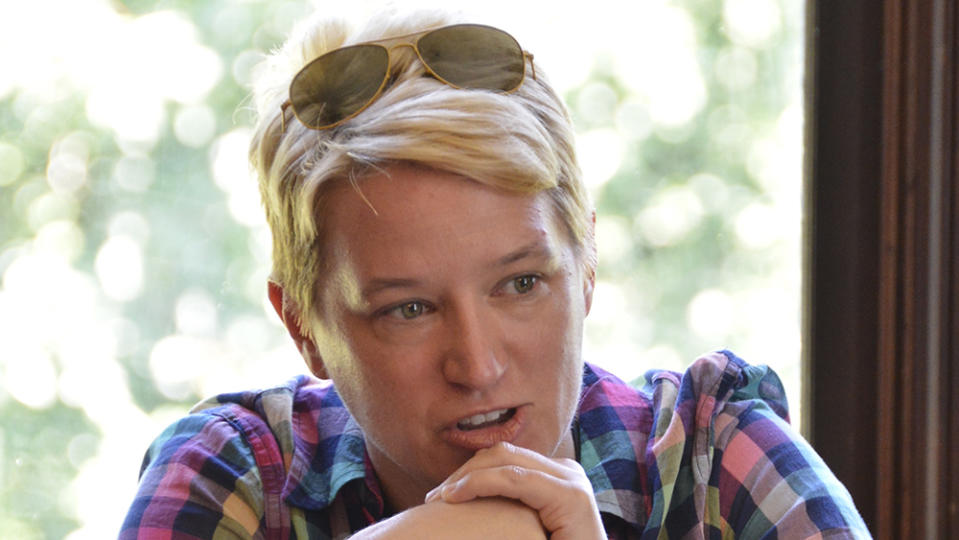
Wendy C. Goldberg, Master Lecturer
Boston University
Inheriting a challenging set of circumstances as a newly appointed master lecturer at Boston University’s College of Fine Arts, Goldberg says that her previous experience in theater and alternative digital forms underscored the existential similarities between pandemic living and the entertainment industry’s ongoing vagaries. “There is an important desire to keep our work and training relevant to the ever-changing professional landscape so as to provide our students the most varied and useful training geared toward professional opportunity,” Goldberg says. “It is imperative that I prepare students by helping them to tap into their most imaginative ideas and finding ways to work on those as professionals — and to recognize, as storytellers, we have an obligation to speak to our moment in history.”
UCLA School of Theater, Film and Television
With three alumni in contention for Academy Awards recognition this year, UCLA continues to maintain an impeccable filmmaking pedigree as an institution not just located in the heart of the entertainment industry but one developing its current and future leaders. In addition to its tremendously popular film classes, courses including the L.A. rebellion and its heritage assembled a diverse and accomplished roster of guests to give students unique insights into their film school and professional experiences. Meanwhile, a recently completed Media Arts Lab expands production training to include virtual and augmented reality, preparing students for new platforms and creative opportunities.

Courtesy of UCLA
California Institute of the Arts
Valencia
At CalArts students learn alongside professional artists working in the biz. Students benefit from instruction in a diverse array of tracks that help expand their aesthetic and cultural knowledge, learning such skills as film production, animation and screenwriting. Intellectual curiosity and rigorous teaching go hand in hand to help students achieve success in their future careers.
California State University, Northridge
With a campus in L.A.’s San Fernando Valley, the Mike Curb College of Arts, Media and Communication offers students the opportunity to witness professional productions up close and personal — and sometimes, to become involved themselves. Seven programs offer a broad variety of tracks in both professional and academic training in an environment that encourages and facilitates diversity. With an extensive roster of alumni working in the industry, students learn from a variety of experts and veterans, while a bustling network of professionals helps them enter the entertainment business in their chosen discipline.
Centro de Capacitación Cinematográfica
Mexico
A film school belonging to Mexico’s Secretariat of Culture, the CCC was founded in 1975 and has steadily grown into a cutting-edge institution providing technical and artistic training for students working to enter the film industry. Working with accomplished instructors, students produce around 40 short films per year. Balancing film theory and practice, different programs offer a variety of opportunities for specialization, and give students the opportunity to double up on disciplines. The Opera Prima project, supported financially by the Mexican Institute of Cinematography, invites young filmmakers to compete for the chance to produce their own debut feature with professional support.

Courtesy of Marta Donzelli
Marta Donzelli, President, Foundation
Centro Sperimentale di Cinematografia
Rome
Italy’s National Film School, launched in 1935 as the Experimental Cinematography Centre, is the oldest film school in the world and among the finest. In March young producer Donzelli, co-founder of indie shingle Vivo Film, was appointed to head the venerable institution whose graduates include directors Michelangelo Antonioni and, more recently, Susanna Nicchiarelli.
Donzelli’s goals: “During my tenure we will focus on expanding the school’s international footprint,” she says. But Donzelli is also determined to bring more women into the film industry fold. As she points out, “there’s plenty of work that still needs to be done so that a woman can imagine herself as a film director or a cinematographer, or a sound designer.”

Courtesy of David Needleman
Stephen Galloway
Dean, Chapman University, Dodge College of Film & Media
Orange, Calif.
After 25 years as executive editor of the Hollywood Reporter, Galloway knows the entertainment industry at a level matched by few others. But since his appointment in early 2020, Chapman University’s dean of the Dodge College of Film & Media has focused less on where he’s been than where his students are going. “The surge of streaming has led to a collapse of the old divisions between the film and TV businesses,” Galloway says. “One of the major things going on behind the scenes is to get rid of these silos.”
“Our goal is to teach you to think,” he says. “You’re entering a world where technology is changing all the time, so it’s not enough to teach you to use a camera. We teach you to think about how and why you’re using that camera.”
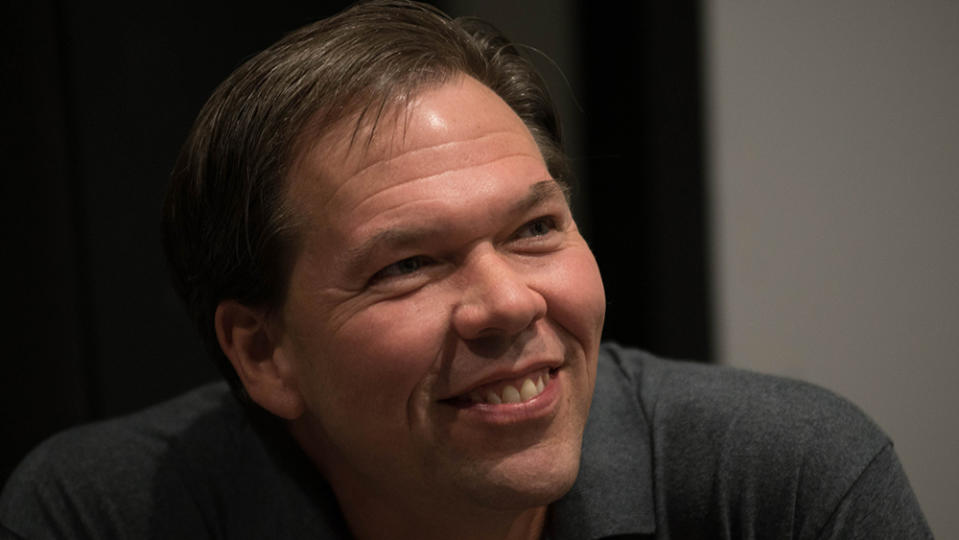
Courtesy of Will Hicks
Will Hicks
Head of Screenwriting/Producing Program
Colorado Film School
Denver
With more than 100 professional film credits, Hicks brings a wealth of insight to his role as Colorado Film School’s head of Screenwriting/Producing Program — none more important than facilitating an environment where artists learn and develop the confidence to express themselves authentically. “An instructor’s most important responsibility is to respect what a student is striving to say through art,” Hicks says. “That means building a safe space for students to make mistakes and to take creative risks. Each person’s creative journey differs, and because we encourage personal storytelling, it makes sense to get to know the person telling the story. Respect means being honest with criticism, but to offer it in a way that nurtures and inspires creativity.”
Columbia College Chicago
As a school specializing in arts and media disciplines, Columbia College Chicago doesn’t split its focus and resources instead cultivating an immersive environment for creative exploration. And during a challenging year of maintaining educational standards in the face of a worldwide pandemic, its staff shepherded students through curriculum, and eventually, practical work via the school’s Media Production Center, which supports traditional, multi-camera and virtual filmmaking projects. Scholarships including the Diana King Memorial Fund ensure support for undergraduates with financial need, and supplemental opportunities such as Ava DuVernay’s Array Internship offer practical experience and pave the way for future professional opportunities.
Columbia University School of the Arts
New York
With an acceptance rate of 6% for its master of fine arts program, Columbia’s film track is highly selective, especially with only two concentrations: screenwriting/directing and creative producing. Students from across the globe compete for space in a curriculum offering practical hands-on experience, challenging them to refine and develop their creative sides. A faculty of working professionals from both studio and independent backgrounds, coupled with the appeal of its New York City location, makes for an environment in which students are surrounded by a community boasting vast artistic, educational and professional resources.
DePaul University
Chicago
Located in downtown Chicago, the School of Cinematic Arts, housed within its College of Computing and Digital Media, offers bachelor’s and master’s degrees in film and television, animation, creative producing and screenwriting. State-of-the-art facilities and equipment, as well as the expertise of an accomplished faculty, helps pave the way for students to develop their talents in specific disciplines.

Courtesy of Cristina Kotz Cornej
Cristina Kotz Cornejo
Visual and Media Arts Chair
Emerson College
Boston and Los Angeles
After graduating from NYU and USC, and dividing much of her career among Boston, Mexico City and Buenos Aires, Cornejo truly brings a global perspective to her role as Emerson’s visual and media arts chair. “As faculty, one of our primary responsibilities is making sure that our students become responsible media makers and understand the power and influence they will possess in the development and creation of media productions,” she says. “So our program takes us into the 21st century when looking at media production and studies. We offer an opportunity for students to focus on a single discipline or create their own multidisciplinary plan of study, so they are served by having knowledge in both broad technical skills and in intellectual and theoretical engagement.”
Florida State University College of Motion Picture Arts
Tallahassee
With an alumni list that includes Barry Jenkins, Wes Ball and David Robert Mitchell, FSU’s College of Motion Picture Arts promises guaranteed funding for every student’s project as well as access to professional-caliber equipment and facilities. The program’s track starts with the development of short films and culminates in a senior thesis film, with a focus on fictional narrative films that integrate screenwriting, production and film analysis. Major courses include everything from animation to film aesthetics, with the goal of producing educated, literate, creative filmmakers.

Courtesy of Carl Verna
Carl Verna
Senior Lab Instructor
Full Sail University
Winter Park, Fla.
As a former Full Sail student himself, Verna not only intimately knows the school’s strengths, but also understands how to shape its curriculum, and its faculty, to help his students achieve their creative and professional goals. “Full Sail film degree programs have been ahead of the film industry technology curve since their inception,” Verna says. “But its educators have both the academic background and four years of required professional experience — real-world first-hand knowledge that gives our students an advantage.
“Our biggest responsibility is to let our students dream big, but with realistic expectations of what it takes to get there,” he says. “This helps students graduate with a clear vision and realistic and achievable milestones that are less intimidating.”
Hofstra University
Lawrence Herbert School of Communication
New York
With proximity to a bustling multicultural metropolis and a college campus located on Long Island, Hofstra University is a choice film school. Students at the Lawrence Herbert School of Communication start working with cameras on day one with three soundstages and state-of-the-art equipment available. With small, limited-class sizes, Hofstra continues to expand its filmmaking programs, offering BFA degrees in production and performance, creating a strong foundation in both production work and academic study.
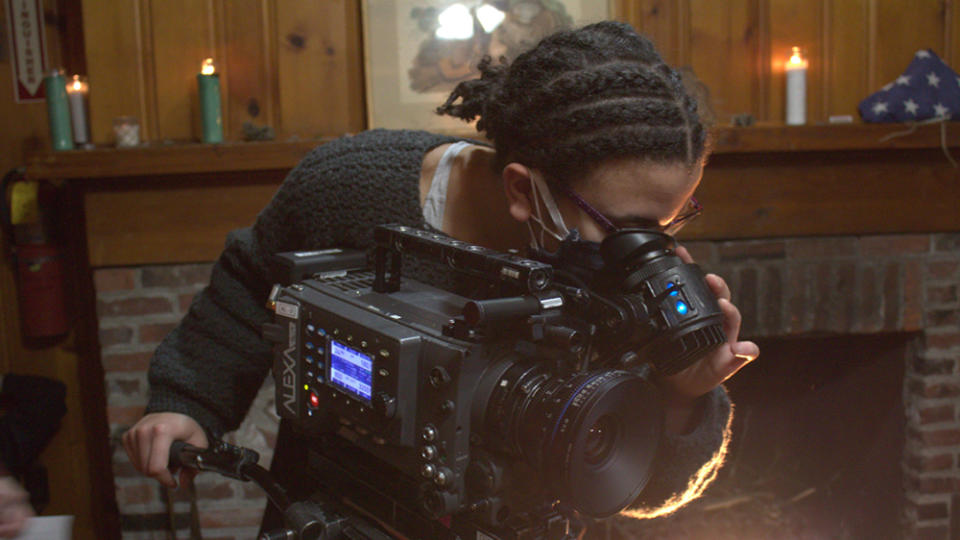
Courtesy of Hofstra University
Identity School of Acting
London and Los Angeles
Although its online program is only open to actors outside London, this award-winning part-time drama school has quickly established itself as an amazing training ground for the next generation of stars. Originally conceived in 2003 with the goal of promoting diversity on the screen by training and recruiting Black and minority actors, Identity School opened a Los Angeles branch in 2018 bolstered by its success with alumni including John Boyega, Letitia Wright and Damson Idris. In particular, its screen curriculum helps actors deliver truthful, authentic performances by focusing on the technology and technique specifically required to succeed in film and television.
Ithaca College’s Roy H. Park School of Communications
New York
At the Roy H. Park School, faculty treats students as young professionals from the day they set foot on campus. They are immersed in hands-on production courses including both analog and digital filmmaking and enjoy access to the latest technology and filmmaking equipment. At its 2020 commencement ceremony, graduating students showcased their projects. Recently, the school collaborated with a Syracuse PBS affiliate on a pandemic series exploring the lives of film students, facilitating creative solutions even when higher-profile technological resources were unavailable.

Courtesy of Adam Baker
Juilliard School
New York
After 116 years and counting, this New York City performing arts conservatory carries a pedigree known the world over, teaching time-honored acting techniques while helping students adapt to the diverse platforms and changing landscape of the entertainment industry. The four-year BFA acting program not only trains students in movement, voice, technique and other essential aspects of the craft of acting, but also charts a specific but flexible path year by year to give undergraduates the chance to grow and develop their chosen crafts. Most importantly, Juilliard ensures the growth of students in a community-focused environment committed to their growth, not just as professionals but also as artists.
Korean Academy of Film Arts
Seoul
Describing itself as a “cradle for highly trained and creative professionals,” South Korea’s leading film school provides a creatively nurturing educational environment. After more than 35 years in operation, the school is well established, offering a broad spectrum of courses including film directing, animation, cinematography and producing. Students participate in the production of four features each year. Small classes give them more opportunities for close collaboration and interaction with instructors. A priority on the production end of filmmaking — and stringent reviews throughout 40 weeks of training — help experienced students develop deeper expertise in their fields.
The Los Angeles Film School
Considered an academic leader in the entertainment community for over 20 years, Los Angeles Film School has developed a curriculum expressly designed to prepare students for the rigors — and changes — of the entertainment industry. During COVID-19, the program pivoted to remote learning, and more importantly, loaned equipment that allowed students to safely develop their talent without taking unnecessary risks or violating L.A. County’s stay-at-home orders. A robust career development team has also prioritized the Motion Picture Academy’s Gold Internship program to facilitate future learning and work experience for top students in the program.

Courtesy of Bryant Keith Alexander
Bryant Keith Alexander
Dean of the College of Communication and Fine Arts
Loyola Marymount School of Film and Television
Los Angeles
At LMU, Alexander cultivates partnerships with more than 400 internship companies so that students can get hands-on industry access. The school also provides its students with a personalized experience through small class sizes and a collaborative, hands-on approach. “Loyola Marymount is uniquely positioned to prepare students to thrive in a competitive global environment,” Alexander says. “It is more essential than ever to impart that critical and creative thinking allows us to be better filmmakers, media consumers, and citizens.”
Entertainment is an incredibly powerful medium,” he continues. “As such, we endeavor to instill in our students both the responsibility and joy that comes with creating for a mass audience.”
University of Michigan
Ann Arbor
The department of film, television and media encourages intellectual study and practical disciplines, integrating critical studies and creative production programs that explores film, video art, television, and digital media. The program’s curriculum celebrates diversity in theory and practice in an effort to generate positive, productive working environments as students seek jobs in a constantly changing industry. The department fosters a strong intellectual and artistic community for students in the Midwest and Great Lakes region with a rapidly growing doctoral program in film, television and other media.
Mount Saint Mary’s University
Los Angeles
Classes are conducted at the university’s studio situated smack dab on Hollywood Boulevard, surrounded by the El Capitan and TCL Chinese Theatres. The university itself is a popular place for filming and has been showcased in TV favorites “Veep,” “Gilmore Girls” and “The O.C.,” among others. Students begin hands-on experience as early as their first semester, and those in the MFA program leave with a demonstrative creative and technical portfolio.
University of Nebraska
Lincoln
At the Johnny Carson School of Theatre & Film, undergraduate students earn degrees in performance, design/technical production and emerging media arts, while graduate candidates have the option to study stage or costume design. The Mary Riepma Ross Media Arts Center offers students access to the 250-person Joseph H. Cooper Theater, which screens independent movies; a 105-person theater; and film storage archives that include nearly 2,000 titles.
New York Film Academy
The New York Film Academy holds value in its breadth of options. Whether looking for a trade school-type program or university experience, students can choose to earn film degrees or complete the institutions’ workshops or one- or two-year programs. What’s more, it has campuses in Los Angeles, New York City and South Beach, Fla. The academy also conducts classes around the world in cities such as Beijing and Paris. International students are welcome to all campuses and can pursue an education in both film and the English language by enrolling at the NYFA’s ESL School.
New York U. Tisch School of the Arts
With filmmaking greats including Spike Lee among its tenured professors, Tisch is considered one of the world’s premier centers for film education. Argentine filmmaker Julia Solomonoff (“Nobody’s Watching,” “Hermanas”) recently joined as the incoming chair of Tisch’s graduate film department. Each year, the graduate film program announces the Purple List. Inspired by the Hollywood Black List, a panel of industry professionals select the best feature film screenplays of students and recent alumni. This year marks the 10th anniversary of the list. Oscar-nominated alumni include Shaka King (“Judas and the Black Messiah”) and Chloé Zhao (“Nomadland”).
University of North Carolina School of the Arts
Each spring, UNCSA co-hosts the RiverRun Intl. Film Festival, at which students can take in screenings of a wide array of films. Though 3,000 miles away from the heart of Hollywood, students are firmly connected to the entertainment industry. Every year, seniors travel to Los Angeles with faculty mentors to screen their films for industry executives and UNCSA alumni, setting them up for life post-graduation. Budding filmmakers at the school select a field of concentration and collaborate with their peers on original short films that are then submitted to festivals around the world.

Courtesy of Peter J. Mueller/UNC

Courtesy of Felton Kizer
Aymar Jean Christian
Media Scholar and Co-Founder of Open Television
Northwestern U.
After working in numerous academic and professional spheres, Christian brings well-rounded knowledge to his role at Northwestern, emphasizing the industry’s constant changes as both a challenge and opportunity for future professionals. “The film program is nestled in a school that also has a theater performance program and a communication and media studies department, so students here get a really well-rounded education,” Christian says. “They’re set up not only to make films, but also collaborate and enter the business. And honesty is key. Hollywood is unlike any other business, some of which is great for art and some which isn’t. So we have to be honest about what they’re getting into, so that they’re prepared emotionally and intellectually.”
Pepperdine University
Malibu, Calif.
Pepperdine connects qualified students to internships at one of Los Angeles’ many production companies and is a co-sponsor of the City of Angels Film Festival. Film majors develop essential technical skills, but also study cinema as a cultural force, exploring how it intersects with religion, politics, race, gender, values and globalization. Pepperdine’s MFA program in writing for screen and television has brought in the likes of Lester Holt, Patricia Heaton and Morgan Freeman to teach and speak on campus.
Pratt Institute
Brooklyn
Pratt graduates learn the skills to become “total filmmakers,” with the ability to create, write, direct and edit. Students complete a senior project film that is screened for the public. In recent years, these screenings have taken place at the Brooklyn Academy of Music. Students are also offered the chance to intern at such places as Museum of Modern Art or even on the set of “Saturday Night Live.” Visiting lecturers in 2020 included Academy Award-nominated filmmaker Garrett Bradley, writer-director Nia DaCosta and Amazon Studios producer Brandon Harris.
Rhode Island School of Design
With approximately 145 undergraduate majors, RISD’s film/animation/video facilities have production studios as well as rooms for digital editing and sound mixing. The bachelor’s program offers a comprehensive curriculum in which students can establish a foundation in basic technical skills and explore a wide variety of film genres. Juniors can tackle ambitious projects that involve cinematography, sound design, compositing, lighting and storyboarding. Juniors and seniors have the opportunity to screen their finished films to the public at a popular spring film festival.

Courtesy of Kendall Brugger
Kendall Brugger
INDEX Director, Industry Experience at Ringling College Business Professor, Business of Art and Design Program
Ringling College of Art and Design
Sarasota, Fla.
From her undergraduate education at SCAD to a master’s in design management from Pratt Institute, Brugger transformed her way of thinking to consider the human perspective in all aspects of design. As a professor at Sarasota’s Ringling College of Art and Design, she hopes to create that kind of change in her students. “We’re seeing changes across all businesses as industries continue to evolve and react to technological and cultural influences,” she says.
“My priority is equipping students with the tools to create meaningful content and impactful storytelling — to encourage critical thinking by challenging students to ask, “what are the dimensions of this that aren’t being looked at? This mentality and approach helps develop your creative strategy. It’s what gives work purpose, reason and meaning.”

Courtesy of Rutgers University
Thomas Lennon
Director of Documentary Film Labs
Rutgers U., Mason Gross School of the Arts
New Jersey
Lennon’s documentary work has premiered twice at Sundance, earned two Emmys, an Academy Award, and four more nominations. As Mason Gross School of the Arts’ director of Documentary Film Labs, Lennon believes in a holistic approach to teaching filmmaking. “There’s obviously a lot of discussion right now about diversity,” Lennon says. “But there’s also the diversity that comes with helping somebody find their own particular voice and their own sensibility.
“I think that the era of specialization is not over, but I think it’s deferred,” he says. “I think it’s endlessly more flexible than it was. They will probably fork off at some point, but at Rutgers they’re invited to be total filmmakers.”
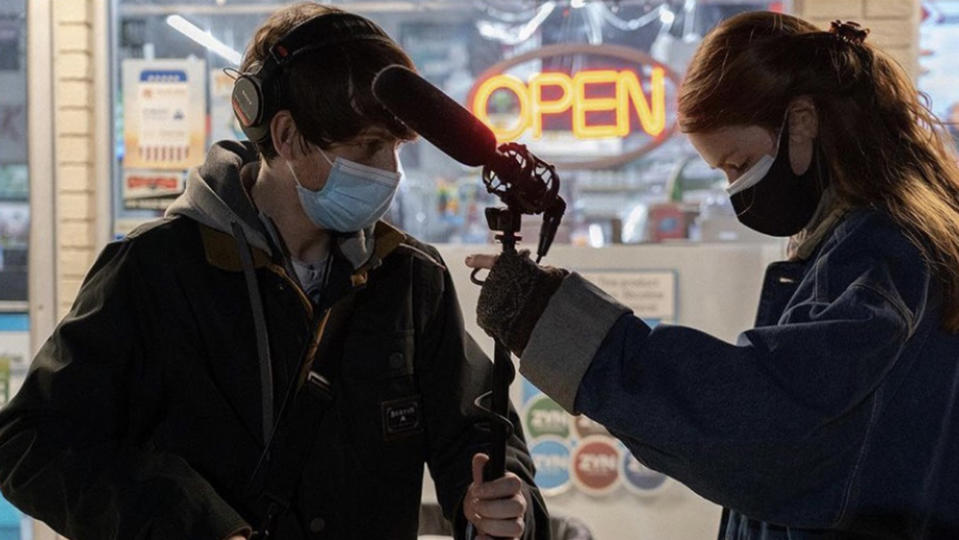
Courtesy of Rutgers University
San Francisco State University
Founded amid the artistic experimentation of the 1960s, the School of Cinema at SFSU continues to challenge social and artistic norms. After the school received the largest gift in its history from George and Judy Marcus, it has been able to bolster curriculum development and add two endowed chairs. Despite the pandemic, students were able to premiere their thesis films during SFSU’s online end-of-year showcase. The school is currently developing the Archive Project, an online collection of classic feature films, documentaries, animated films, experimental films, and student short films. The Archive Project will launch by 2024.
Savannah College of Art and Design
Georgia
SCAD is building a Hollywood-style film backlot and state-of-the-art XR Stage for virtual productions. From costume and sound designers to actors and animators, this will provide students from an array of degree programs the opportunity to collaborate on cross-disciplinary projects and have industry mentors provide insight throughout the year. The SCAD Film Studios complex will also include a facility dedicated to production, costume, and set design, allowing students to bring these new film environments to life. These facilities will further SCAD’s substantial impact on the film and television industry in Georgia and beyond, creating the next generation of creative leaders.
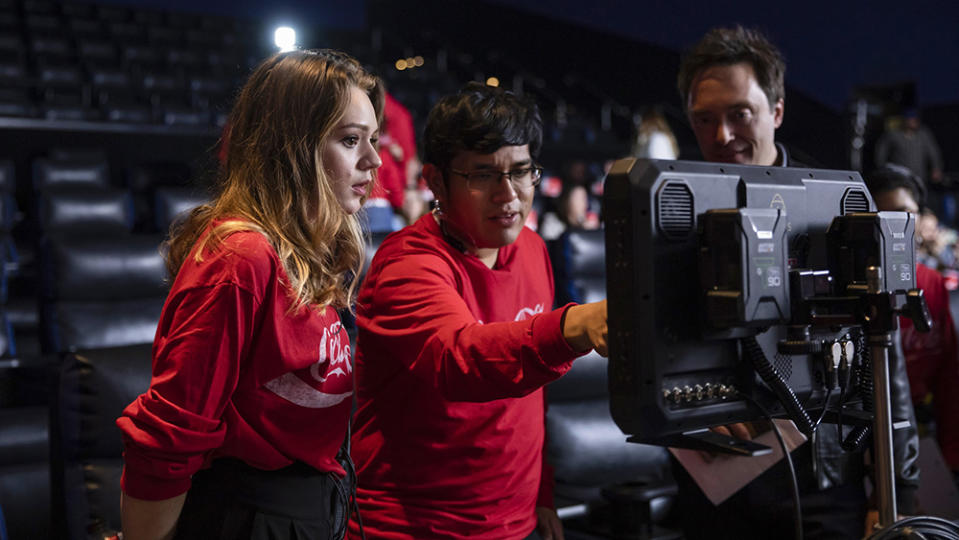
Courtesy of Aman Shakya/SCAD
Sarah Lawrence College
Bronxville, N.Y.
The undergraduate filmmaking and moving image arts program helps students navigate the intersection of art and technology. The world-renowned faculty values one-on-one time with students and welcomes collaborations between faculty and students. Undergraduate students have the opportunity to begin graduate work during their senior year and earn a combined degree program in engineering with Columbia University. This allows students to leave the college with two degrees after five years and enter the industry with a distinguished advantage.
USC School of Cinematic Arts
Los Angeles
USC had a big year at the 47th annual Student Academy Awards, with four winners, including Curry Sicong Tian for “Simulacra,” Allison A. Waite for “The Dope Years: The Story of Latasha Harlins,” Yucong Chen for “Unfinished Lives” and Rommel Villa Barriga for “Sweet Potatoes.” The Entertainment Technology Center at USC selected alumni filmmakers Hannah Bang, Margo Sawaya and Sabina Vajraca to receive the 2020 Innovative Technology Award for their project “The Ripple Effect,” which tested the limits of virtual production to help the industry navigate COVID production protocols.

Courtesy of USC
Stanford University
The film and media studies department offers a major and minor curriculum that includes film aesthetics, traditions, modes of production in narrative, documentary and experimental styles and innovations in digital media. With courses that cover theoretical approaches to media as well as screenwriting and directing, one of the program’s main objectives is to develop a critical understanding of the role of cinema in a broader cultural and historical context. Students can earn a B.A. in film and media studies or an MFA in documentary film and video.
Syracuse University
The film program at Syracuse University encompasses every aspect of the film industry, from screenwriting to post-production. Blending theoretical and practical approaches to filmmaking, the curriculum offers courses in film perception, acting, directing and sound design. Students pursue various modes of production in addition to taking history and theory courses, where they develop conceptual and critical skills that prepare them for filmmaking. The program allows students to study abroad, get involved with the annual Syracuse Intl. Film Festival and even attend Sundance Film Festival as part of the Sundance Ignite initiative.
University of Texas at Austin
Moody College of Communication
Radio-Television-Film Department
The radio-television-film program at University of Texas at Austin offers hands-on education spanning across various media types. The department cultivates an interactive experience, utilizing the university’s location in the heart of Austin’s vibrant arts and tech industries. Students studying radio, television and film at UT Austin can take a variety of courses across media history, the entertainment business and production. For instance, Matthew McConaughey teaches a course on film production. The university offers an undergraduate bachelors of science degree, two related minors and several graduate degrees in media studies, screenwriting and film and media production.
Vanderbilt University
Nashville, Tenn.
The department of cinema and media arts features a flexible curriculum with special topics attuned to pressing issues, including cinema in the age of Trump, queer global cinema and cinema and climate change. Students work in 16mm celluloid and digital platforms, write for both stage and screen and consider the history and theory of cinema. Students can also participate in the Vandy-in-Hollywood internship program founded and run by VU alums Richard Hull and Chad Gervich. Additionally, VU’s immersive senior cap-stone seminar in which students create work in a variety of genres and media with the goal of having a portfolio by graduation.
Wesleyan University
Middletown, Conn.
The College of Film and the Moving Image includes an undergraduate film major and minor that balance the study and practice of visual storytelling. Taking courses that focus on aesthetics, genre, authorship, industry and technology, students can also participate in the Wesleyan Film Series. The university stresses collaboration and accessibility, with a curriculum that teaches “about the films themselves in a jargon-free classroom.” Students are also encouraged to enroll in a capstone experience, which can include a filmed thesis, writing thesis, senior paper, archival project and more.
University of Wisconsin Milwaukee, Peck School of the Arts
The university offers a BFA in Film and a B.A. in animation, as well as an MFA in cinematic arts. Peck employs a holistic approach to film, enabling students to explore all facets of the industry. With faculty members who regularly screen at festivals and exhibition spaces around the world, the program maintains partnerships with the Milwaukee Film Festival, Wisconsin Film Festival and the Milwaukee Art Museum. The community-based UWM Union Cinema, based on campus, fosters collaboration between students and local filmmakers.
Vancouver Film School
Canada
The Vancouver Film School offers a variety of innovative programs, including digital design, 3D animation and visual effects and makeup design for film and television, while also maintaining top-tier acting, writing and production departments. With an accelerated education model, VFS trains students in an intensive, hands-on method that prepares them to pursue a career in the creative arts after just one year. With eight campuses located in the heart of downtown Vancouver, VFS boasts state-of-the-art production spaces, film sets, studios, screening rooms and a 280-degree green screen room.
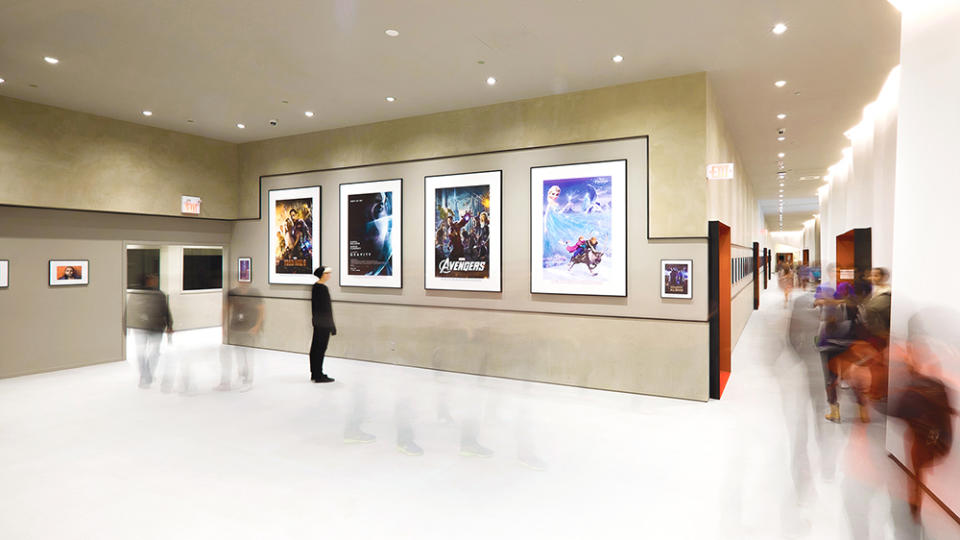
Courtesy of Vancouver Film School
Yale University
New Haven, Conn.
Yale’s Film and Media Studies department offers both undergraduate and graduate programs with courses ranging from the golden age of television to the Greek weird wave cinema. Students have access to the Yale Film Archive — which is home to a vast array of film prints, DVDs, Blu-ray and VHS tapes — and can submit their own work to the Yale Student Film Archive. With only about 30 students per graduating class, Yale’s intimate film program emphasizes both theoretical and methodological analysis while introducing students to the rich traditions of film around the world.
Best of Variety
Sign up for Variety’s Newsletter. For the latest news, follow us on Facebook, Twitter, and Instagram.


